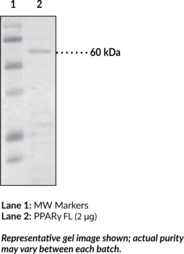Territorial Availability: Available through Bertin Technologies only in France
- Correlated keywords
- peroxisomes proliferator-activated receptors PPARs proliferator activated PPARgamma PPAR.gamma. PPARg PPAR? PPAR-? PPAR-gamma gamma g ? .gamma. PPAR-.gamma. PPAR-g human recombinant nuclear receptors ligands activated ligand-activated activates transcription factors heterodimerizes retinoic acids genes regulations expression differentiation hormones subtypes PPAR? PPAR? hNUC1 PPAR? pathology obese obesity diabetes atherosclerosis cancers adipose tissues expressed colon immune systems retina DNA binding domains binds DBD transcription factor assays 10006855 gel electrophoresis coomassie stains staining fluorescent displacement ANS rosiglitazone
- Product Overview:
Peroxisome proliferator-activated receptors (PPARs) are members of the nuclear receptor family of ligand activated transcription factors that heterodimerizes with retinoic acid-like receptors to regulate gene expression and differentiation.{7654} The PPAR family of nuclear hormone receptors consists of three subtypes encoded by separate genes: PPAR?, PPAR? (also referred to as hNUC1, PPAR?, or FAAR), and PPAR?. Among them PPAR? is the most widely studied and has been implicated in the pathology of numerous diseases including obesity, diabetes, atherosclerosis, and cancer.{12922} PPAR? is primarily expressed in adipose tissue and to a lesser extent in the colon, immune system, and the retina.{12196} PPAR? FL (human, recombinant from E. coli) purity was determined using gel electrophoresis followed by coomassie staining.
Cayman Chemical’s mission is to help make research possible by supplying scientists worldwide with the basic research tools necessary for advancing human and animal health. Our utmost commitment to healthcare researchers is to offer the highest quality products with an affordable pricing policy.
Our scientists are experts in the synthesis, purification, and characterization of biochemicals ranging from small drug-like heterocycles to complex biolipids, fatty acids, and many others. We are also highly skilled in all aspects of assay and antibody development, protein expression, crystallization, and structure determination.
Over the past thirty years, Cayman developed a deep knowledge base in lipid biochemistry, including research involving the arachidonic acid cascade, inositol phosphates, and cannabinoids. This knowledge enabled the production of reagents of exceptional quality for cancer, oxidative injury, epigenetics, neuroscience, inflammation, metabolism, and many additional lines of research.
Our organic and analytical chemists specialize in the rapid development of manufacturing processes and analytical methods to carry out clinical and commercial GMP-API production. Pre-clinical drug discovery efforts are currently underway in the areas of bone restoration and repair, muscular dystrophy, oncology, and inflammation. A separate group of Ph.D.-level scientists are dedicated to offering Hit-to-Lead Discovery and Profiling Services for epigenetic targets. Our knowledgeable chemists can be contracted to perform complete sample analysis for analytes measured by the majority of our assays. We also offer a wide range of analytical services using LC-MS/MS, HPLC, GC, and many other techniques.
Accreditations
ISO/IEC 17025:2005
ISO Guide 34:2009
Cayman is a leader in the field of emerging drugs of abuse, providing high-purity Schedule I-V Controlled Substances to federally-licensed laboratories and qualified academic research institutions for forensic analyses. We are certified by ACLASS Accreditation Services with dual accreditation to ISO/IEC 17025:2005 and ISO Guide 34:2009.





